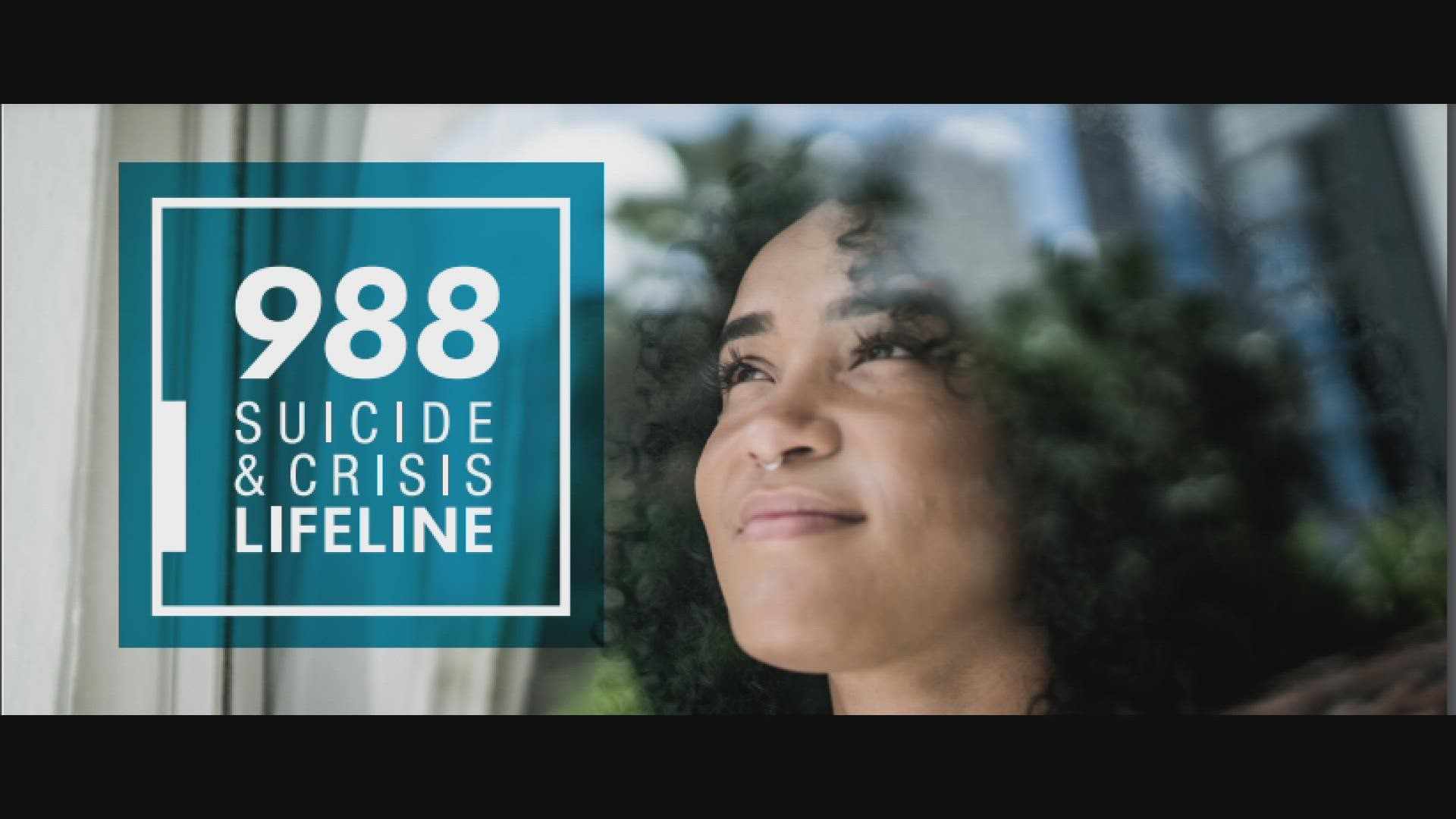LACEY, Wash. — Anyone in crisis no longer needs to dial 10 numbers to get help after a new initiative aimed at easing the process of contacting the National Suicide Prevention Lifeline went live on Saturday, July 16.
Callers across the United States will now be able to reach the National Suicide Prevention Lifeline nationwide by simply dialing 9-8-8.
The Federal Communications Commission (FCC) has designated the three-digit number to provide access to the lifeline, even though some areas already allowed callers in crisis to reach the lifeline by dialing 988. In 2021, Gov. Jay Inslee signed a bill into law designating 988 as the state's suicide prevention hotline, as part of the nationwide system. The state allocated $95 million to develop the program over the next several years.
The number is designed to be as easy to remember and use as 911, but instead of a dispatcher sending police, firefighters or paramedics, 988 will connect callers with trained mental health counselors.
The federal government provided over $280 million to help states create systems that will do much more, including mobile mental health crisis teams that can be sent to people’s homes and emergency mental health centers, similar to urgent care clinics that treat physical aches and pains.
“988 is a new, easy way to remember how you can get support when you're in a mental health crisis, or while you're experiencing one or maybe you're supporting a family or a friend or a co-worker," said Michele Roberts, Washington State Department of Health (DOH) assistant secretary.
Three crisis lines in Washington are now part of nearly 200 other call centers nationwide that will answer the call in a time of need.
According to the state DOH, "Crisis Connections” is the call center for King County, “Frontier Behavioral Health” is the center for six counties in northeastern Washington, and “Volunteers of America of Western Washington” is the center taking calls for the rest of the state.
Roberts said the state has hired and trained more than 130 people to support the 988 calls and plans to hire around 20 more.
"A lot of folks who do need to reach out, do need to be able to talk to somebody who is trained, somebody to support them, help them navigate through their crisis, but then also help them reach resources and community," said Michelle McDaniel, CEO of Seattle-based Crisis Connections.
McDaniel said there has been a 26% increase in crisis calls at her organization since 2019. She anticipates that number will increase with the new service.
"We're averaging about 1,500 calls a month right now, and we're expecting that to double in the next few months, so we've been ramping up staffing in order to make sure no one who calls ends up going on hold," said McDaniel.
With state funding, Crisis Connections went from three employees picking up National Suicide Prevention calls, to 35 new employees. McDaniel hopes people will utilize the number at all hours starting July 16.
"No issue is too big or too small. Call 988 if you have concerns. Call 988 if you're worried about yourself. Call 988 if you're not even sure who to talk to about an issue you're going through," said McDaniel.
Dr. Juan Antonio Avila with Overlake Medical Center said the number of mental health providers and facilities is still lacking in the state but believes the new initiative is a step in the right direction.
"The professionals are here to help you,” said Avila. "We're here to support you; we want to get you connected with the places there are going to be treating you and giving you what you need in order to get your life back on track."
Is the suicide prevention hotline number changing?
The 988 system will build on the National Suicide Prevention Lifeline, an existing network of over 200 crisis centers nationwide staffed by counselors who answer millions of calls each year — about 2.4 million in 2020. Calls to the old lifeline, 1-800-273-8255, will still go through even with 988 in place.
“If we can get 988 to work like 911 … lives will be saved,’’ said Health and Human Services Secretary Xavier Becerra.
Dispatching paramedics for heart attacks and police for crimes makes sense — but not for psychiatric emergencies, mental health advocates say. Calls to 911 for those crises often lead to violent law enforcement encounters and trips to jail or crowded emergency rooms where suicidal people can wait days for treatment.
The 988 system “is a real opportunity to do things right," said Hannah Wesolowski of the National Alliance on Mental Illness.
Sustained funding will be needed. According to the National Academy of State Health Policy, four states have enacted laws to impose telecommunications fees to support 988 and many others are working on the issue.
A desperate call to a Utah state senator in 2013 helped spark the idea of a three-digit mental health crisis line.
Sen. Daniel Thatcher says a good friend sought his help after taking his suicidal son to an emergency room, only to be told by a doctor to come back if the boy hurt himself.
Thatcher has battled depression and at 17, he also considered suicide. He knew that despondent people in crisis may lack the wherewithal to seek out help or to remember the 10-digit national suicide lifeline number.
Thatcher found that many of Utah’s in-state crisis lines went straight to police dispatchers or voicemail. He wondered why there was no 911 service for mental health, and the idea got national attention after he mentioned it to longtime Sen. Orrin Hatch.
If you or someone you know is in crisis, call the National Suicide Prevention Lifeline at 800-273-8255 or 988, text HOME to 741741 or visit Vibrant Emotional Health’s Safe Space for digital resources.
The Associated Press contributed to this report.

